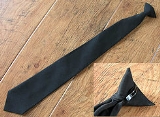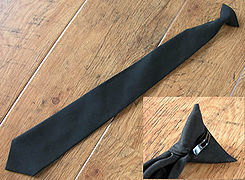
Clip-on tie
Encyclopedia

Bow tie
The bow tie is a type of men's necktie. It consists of a ribbon of fabric tied around the collar in a symmetrical manner such that the two opposite ends form loops. Ready-tied bow ties are available, in which the distinctive bow is sewn into shape and the band around the neck incorporates a clip....
or four-in-hand tie
Necktie
A necktie is a long piece of cloth worn for decorative purposes around the neck or shoulders, resting under the shirt collar and knotted at the throat. Variants include the ascot tie, bow tie, bolo tie, and the clip-on tie. The modern necktie, ascot, and bow tie are descended from the cravat. Neck...
which is permanently tied, with a dimple just below the knot, and which is fixed to the front of the shirt collar by a metal clip. Alternately, the tie may have a band around the neck fastened with a hook and eye.
The clip-on tie was reportedly invented on December 13, 1928 in Clinton, Iowa.
Reasons for use
- Tightly tied standard neckties may be a source of irritation and discomfort.
- Some people either do not know how to tie, or do not feel comfortable tying, a standard necktie, and some with disabilities may not be able to.
- Police officerPolice officerA police officer is a warranted employee of a police force...
s and security guardSecurity guardA security guard is a person who is paid to protect property, assets, or people. Security guards are usually privately and formally employed personnel...
s often wear clip-ons as a precaution against being strangled by a pulled necktie. (With uniform, a tie clip may be used to keep the tie from "flying" in the wind.) A clip-on tie is part of the uniform of the JCB AcademyJCB AcademyThe JCB Academy is a non-selective co-educational secondary school within the English Academy programme, in Rocester, Staffordshire, England. It specializes in engineering diplomas....
for industrial safety reasons. - Some schools require clip-on ties as part of their uniform instead of regular ties as this keeps students from loosening them in hot weather.
- A clip-on tie can be put on more quickly than a conventional necktie.
Criticisms
People in white collarWhite-collar worker
The term white-collar worker refers to a person who performs professional, managerial, or administrative work, in contrast with a blue-collar worker, whose job requires manual labor...
occupations are often mocked for wearing a clip-on tie in lieu of a standard necktie, the implication being that refusal to learn how to tie a "proper" tie reflects a wider lack of sophistication. Pre-tied bow ties are especially disliked in formal circles; according to one writer, "The quirky irregularities of a self-tied bow give it personality and flair... while the cookie-cutter precision of a pre-tied model diminishes it to an assembly-line commodity." Because child-sized ties are often clip-ons, some consider clip-ons juvenile. Finally, clip-on ties are generally available in limited styles, sizes, and prints relative to their conventional counterparts.

